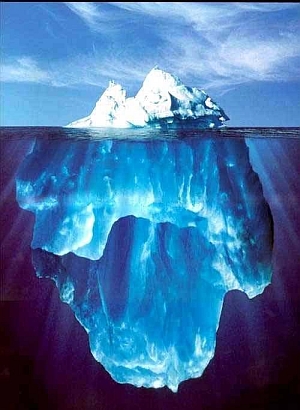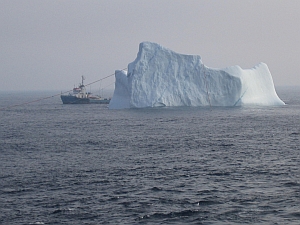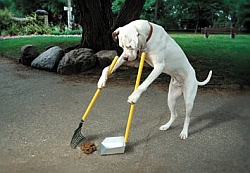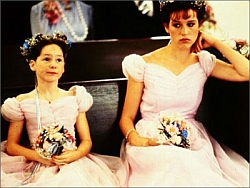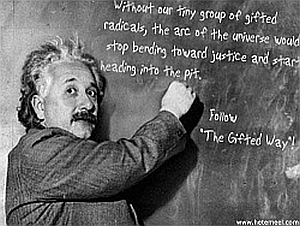When I suggest to female friends or clients that they might be gifted they squirm, they get angry, they laugh it away. “Gifted? Moi? I don’t think so!”
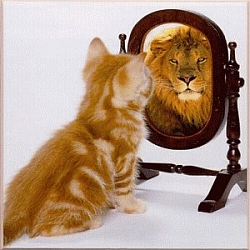
"Each day I see my giftedness more clearly reflected before me."
In itself this is not too much of a surprise. Many clients react to the realization of their giftedness in the same way I did: initial relief, often accompanied by tears, is followed by a dismissive shake of the head and a state of defiant skepticism.
However, for most clients, initial rejection dissolves in the face of reality as their life events and responses consistently mirror the criteria for giftedness so aptly identified by other writers.
For others, however, acceptance seems impossible. “Don’t call me gifted!” they cry, as if threatened by the label.
And it seems to be the women who resist harder than the men.
Real women aren’t gifted
I find it hard to write: “I am a gifted man.” It feels like an invitation to be scorned and dismissed. “Real men aren’t gifted,” says the distorted logic inside me, “so if I’m gifted I’m not a real man”.
In the same way, it seems, gifted women are not real women.
How come? Presumably it’s because “gifted” is a label that, unlike “helpful” or “neighborly”, is perceived in a negative way.
So who might object to a gifted woman? Here is a list of possible culprits:

"Don't cry darling. You can forget those nasty books and be just like mommy now."
- Mother. Not only is her daughter a younger and prettier version of herself, but if she’s gifted she’s special in other ways too. Any mother-daughter competitiveness will swing into action around this one.
- Father. The man who says: “I want her to have the best education available.” is the same one who later says: “I’m your father and I don’t have to listen to your darn fool ideas.”
- Female friends. Women in groups can be brutal in discouraging difference. The need for affiliation has quenched many a woman’s acknowledgment of her giftedness. It doesn’t do to break ranks with the sisterhood.
- Male friends and would-be mates. Heterosexual women still seem to be largely convinced that they need a man to complete them as human beings. The male of the species is not renowned for his embrace of female superiority – other than sometimes in fantasy – so the man-needing woman keeps her enhanced sensibilities and giftedness firmly under wraps.
- Everybody else. Gifted people can be pretty high maintenance. We constantly (and often unconsciously) challenge the prevailing comfortable mood. We are emotionally intense. We are highly sensitive – to physical phenomena as well as human ones.
Given such a comprehensive list of potential offendees, why wouldn’t a girl prefer a J-Lo butt to being gifted?
Maybe the reasons start here:
An imbalance of power
Giftedness is power.
One of the most intriguing statistics in “A Woman’s Nation,” a recently released survey by Maria Shriver and the Center for American Progress, is this: 69% of women think men resent women who have more power than they do. Only 49% of men agree.
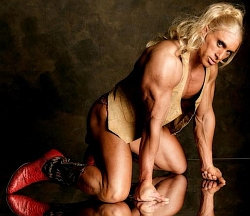
Don't recognize yourself? The distorted visions of frightened inner males are not the truth about you.
My personal hunch – based on decades of observing people in the corporate workplace as well as my work as therapist and coach – is that the women are probably right and the men have a hard time admitting it.
To the small boy inside every man, a powerful woman carries the threatening demeanor of a posing body-builder. It’s true that not every man is dominated by his inner small boy. However, a good many are and, in the turmoil of inner male voices, the small boy always makes his contribution.
Forbes magazine recently asked a few from its list of the 100 Most Influential Women in the World for their personal reflections on power. Here are some of their responses [together with some examples of threatened inner-male reactions]:
- “Power is the ability to create change in the world” – Tensie Whelan, Executive Director, Rainforest Alliance [Oh my God! Napoleonic ambition! Worldwide change! And rainforests are only good for turning into superyachts anyway!]
- Power is not being tied to any person or any thing. “If a deal or a relationship does not make sense, I can walk.” – Lynn Tilton, CEO, Patriarch Partners [She can walk?! Leave me? I know – I’ll get her pregnant and economically dependent and then she won’t be going anywhere!]
- “Power is one’s ability to inspire positive change…to impact the global village.” – Tina Sharkey, Chairman [sic] and Global President, BabyCenter [Complete male-terror. New-age globalization combined with baby expertise.]
- Power is confronting “the demons that prevent us as human beings from living up to our full potential.” – Cheryl Dorsey, MD, President, Echoing Green [Demons? The only demon is a woman who can be an MD as well as a President AND be running a social entrepreneurship investment company. (And that’s only the start. Check her out.)]
- Power is having “the ability to change the world in powerful ways through collaborative and collective efforts.” – Linda Avey, Co-Founder and Co-President, 23and ME [There it is again. Changing the world – and in that touchy-feely socialist way rather than just by stamping your boot on it.]
Once my inner little Christopher gets over his fears, what I find most interesting about these women’s words is that they express their interest in power in abstractions and process-oriented statements.
Of course, they are speaking for publication and would probably hide a truth such as: “What I really like about power is rubbing my mother’s/father’s/teacher’s face in their own BS!”. But on the whole I suspect that what they say is true.
Women, after all, are the process-driven gender. Males read the “Tao te Ching” to learn about power. The Tao tells them to adopt the way of the female.
Women have more power than ever before.
In “A Women’s Nation” Mary Ann Mason reports that women receive:
- 52 percent of high school diplomas,
- 62 percent of associate’s degrees,
- 57 percent of bachelor’s degrees and
- 50 percent of doctoral degrees and professional degrees.
- Women are running more than 10 million businesses with combined annual sales of $1.1 trillion.
- Women are responsible for making 80% of consumer buying decisions.
80 percent! So much for the idea of the all-decisive patriarch.
But three problems persist.
- First, I’m committing the sin of confusing giftedness with eminence. I’m doing this quite deliberately up to this point because I believe the world can benefit hugely from women being able to see that they can attain eminence. And that this eminence does not have to come by adopting the male way.
- Second, women have babies.
- Third, women have parents.
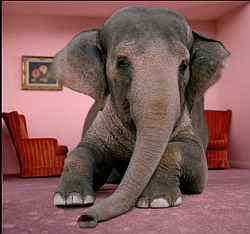
Hi there gifted one! Meet your grandmother . . . father . . . mother . . . child . . .
A major elephant in the gifted woman’s living room is that nearly 86% of women agree that women today still bear the primary responsibility for caring for their sick and elderly parents.
In addition, 85% of women believe that where both partners have jobs, it is the woman who takes on more responsibility for the home and family.
I do not believe that this should be so, and not just from the perspective of injustice. The widespread acceptance of this caring ‘responsibility’ too often results in resentful parents and correspondingly resentful children, or resentful carers and tortured elders.
However, it is a massively reinforced social pressure and may not always be denied. So, I suggest that when gifted women have babies they can be gifted mothers. Or if they must be carers, then be gifted carers.
You don’t have to be captains of industry or firebrand politicians. You can pass your unique influence on through your children, your children’s friends and your parents’ social groups.
Embrace your gifted female-ness
The recognition and understanding of the gifted is largely a female-led discipline. This is unusual in the world of psychology and human development that has largely been dominated by males. For every Melanie or Karen there are three Sigmunds, Karls, Carls, Josef’s, BFs and so on.
However, in the specific field of giftedness it is female insight and intellectual rigor that holds sway. Here are just some of the most influential names in the gifted universe:
- Leta Hollingworth
- Annemarie Roeper
- Mary Rocamora
- Linda Kreger Silverman
- Mary-Elaine Jacobsen
This is not to detract from some very significant male contributions but is intended to focus female readers on the possibility of creating a new sisterhood, one in which the chaos and difference of giftedness is embraced rather than shunned.
Don’t be eminent, be gifted
Even though I’m stuck in a male-centric view of giftedness which, taken to its full potential, results in some form of eminence, you can do better. Here’s a definition of giftedness that says nothing about achievement:
- “Giftedness is asynchronous development in which advanced cognitive abilities and heightened intensity combine to create inner experiences and awareness that are qualitatively different from the norm. This asynchrony increases with higher intellectual capacity. The uniqueness of the gifted renders them particularly vulnerable and requires modifications in parenting, teaching and counseling in order for them to develop optimally.” The Columbus Group, 1991
As you can see, being gifted does not force you into some branch of the elite. It merely means you’re different.
I’ll conclude with this extract from a paper by Linda Kreger Silverman, founder of The Columbus Group. It explains why it is so important to claim your label even if you want to do it quietly.

"Shall I embrace my giftedness or just drown it?"
“Gifted children and adults see the world differently because of the complexity of their thought processes and their emotional intensity. People often say to them, “Why do you make everything so complicated?” “Why do you take everything so seriously?” “Why is everything so important to you?”
“The gifted are “too” everything: too sensitive, too intense, too driven, too honest, too idealistic, too moral, too perfectionistic, too much for other people! Even if they try their entire lives to fit in, they still feel like misfits.
“The damage we do to gifted children and adults by ignoring this phenomenon is far greater than the damage we do by labeling it. Without the label for their differences, the gifted come up with their own label: “I must be crazy. No one else is upset by this injustice but me.”
So please. Don’t settle for crazy. Don’t be a woman. Be gifted.
Thank you.










